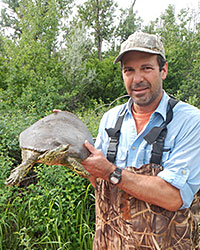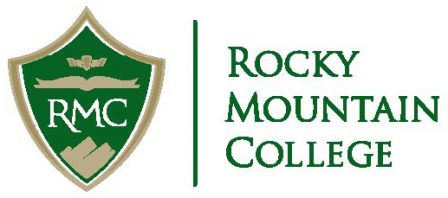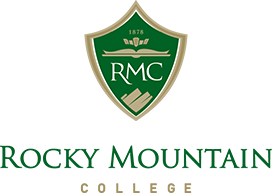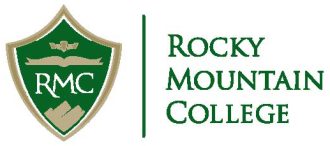Kayhan Ostovar
April 27, 2023 2024-01-19 20:12Kayhan Ostovar

Contact Information
Associate Professor of Biology & Environmental Science
B.S. North Carolina State University
M.S. Montana State University-Bozeman
Phone: 406.657.1175
Office: Tyler Hall 303
Email: kayhan.ostovar@rocky.edu
Office Hours: W 9:00 - Noon; TH 8:00 - 9:00
Biography
Before my teaching career, which began at Rocky Mountain College in 2007, I worked in Africa where I guided safaris and co-founded a community-based conservation organization in the Masai Mara, Kenya to address the commercial bushmeat trade and educate local people and school children about the importance of conservation of the Serengeti Ecosystem. The diversity of species in African and the conservation issues related to human population growth still intrigue me. In 2005, I was the Scientific Director on a multinational expedition and first descent of a tributary of the Blue Nile in Ethiopia.
Ethiopia has experienced massive deforestation (75-85%) related to one of the fastest growing populations in the world. Our goal was to find remnant riverine forest areas and conduct rapid biodiversity surveys. We successfully documented a vast tract of intact forest where we saw African Wild Dogs that were previously presumed extinct in Ethiopia. The question now is how to conserve this remote area and the species that remain. I recently returned to Ethiopia as a delegate for the National Audubon and the Sierra Club to examine new USAID projects that are incorporating family planning and environmental projects. These holistic projects are a new direction taken in international aid and a key towards true sustainable development.
If we don’t recognize the connections between population growth, development, and the environment we will not be successful with our conservation measures.
Much of my research has involved field based projects including studies on howler monkeys and six species of felids in Costa Rica, St. Lucian parrots in the West Indies, black bears in North Carolina, Mexican spotted owls in Utah, marine mammals in Mexico, fisheries management in Montana, bighorn sheep in Yellowstone, as well as large scale biodiversity surveys in Montana, Yellowstone National Park and Ethiopia. To see more learn more about the First BioBlitz in Montana and the first in Yellowstone Park see the following articles:
Billings Gazette:
- http://www.billingsgazette.com/news/local/article_de8d2de6-8aa7-5edb-ab8a-fde6f5dae1b9.html
- http://www.billingsgazette.com/news/local/article_57c89f56-c83c-11de-ab3d-001cc4c002e0.html
Washington Times:
MSNBC:
My goal with teaching students is to awaken an awareness of the importance of biodiversity and our impact, as a wealthy western society, on the environment. I am interested in species distributions and biodiversity specifically related to applied management actions for habitat restoration and conservation. The emphasis of my teaching is to provide field experience and hands-on opportunities for students with an additional recognition of the importance of a stewardship ethic and service to a community. I encourage students to become involved in local organizations. Students at Rocky have participated in projects like the Audubon Yellowstone River cleanup/float that we started six years ago. Students also develop their own projects under our “greener campus initiative” which allows student creativity and ideas developed in classes to actually be implemented on campus.
I have chosen Montana as my home and place of work due to the fact that the Yellowstone Ecosystem is the only place in the lower 48 states where we still have the full complement of large vertebrate species that existed in North America, Pre-colonization. This creates a perfect backyard laboratory for studying many different ecosystem dynamics and changes related to historic and current policy issues related to management of the Greater Yellowstone Ecosystem. The habitats we have available to study include incredible mountain ranges, some of the last remnants of native prairie and important water resources like the glacial potholes.
Many of the classes we teach at Rocky Mountain College focus on issues related to the Yellowstone River (the longest undammed river in the US) and the Greater Yellowstone Ecosystem. In classes such as Yellowstone Winter Ecology students track pine martens and other species on cross country skis, watch the behavior of wolves at elk kills and learn how to survive a night out in winter in a snow cave that they build. We recently created the Yellowstone River Research Center (YRRC), which provides financial support for undergraduate research. YRRC's research programs aim to deepen understandings of the natural, physical, and social processes in this region and how they are influenced by human activities.
For news articles related to student research projects associated with the YRRC see:
The courses we offer in the Environmental Science program at Rocky offer more time in the field than other college programs. If you are considering programs, ask the faculty how often they take students out into the field. Is it two times a semester or twice a week? By exposing students early in their college careers to field techniques, we are able to help them develop observation and scientific questioning skills, and more in-depth ecological knowledge. With the Greater Yellowstone Ecosystem serving as our outdoor classroom and additional short study abroad field courses (Africa, Peru, Galapagos Islands, Costa Rica) we offer students a wealth of opportunities for learning at Rocky Mountain College. My personal work and travels have taken me to nine Africa and 10 Latin American countries. This exposure to other cultures and countries and environmental management systems allows me to include different perspectives and course content in classes.
I have worked with a variety of non-profit and government organizations such as the Nature Conservancy, Wildlife Preservation Trust, Duke University Primate Center, National Park Service, Montana Fish Wildlife and Parks, the Forest Service, Bureau of Land Management, Audubon, Chicago Field Museum, New York Natural History Museum, Masai Mara County Council in Kenya, Born Free, and others. Relationships with these organizations enable me to guide and encourage students to find meaningful summer internship positions as well as employment after graduation.
Courses Taught
- Environmental Science - Sustainable Communities
- Wildlife Conservation
- Bird Conservation and Research
- Tropical Ecology
- Arctic Ecology
- Ecology and Conservation in Africa
- Island Biogeography and the Galapagos Islands
- Field Survey Techniques in Zoology
- Yellowstone Winter Ecology
- Advanced Field Research Techniques
If you are interested in Rocky Mountain College’s Environmental Science Program, please email me at kayhan.ostovar@rocky.edu or give me a call at 406.657.1175.
Contact
Rocky Mountain College
1511 Poly Drive
Billings, MT 59102


